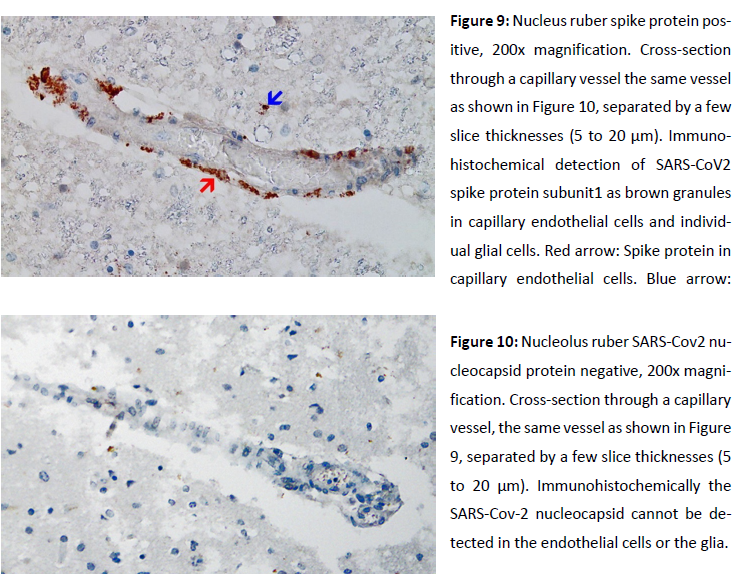Full peer reviewed paper has now been published in Vaccines: Moerz_Encepahilits and Myocarditis after C19 mRNA vax in a 77yo
Full pdf here: German 77yo with myocarditis brain inflammation and spike protein detectable_preprints202206.0308.v2
Citation: Mörz, M. A Case Report: Multifocal Necrotizing Encephalitis and Myocarditis after BNT162b2 mRNA Vaccination against Covid-19. Preprints 2022, 2022060308 (doi: 10.20944/preprints202206.0308.v2).
Autopsy Presentation
“This report presents the case of a 77-year-old male who passed away three weeks after his third COVID-19 vaccination in January 2022. The patients received the first vaccination dose in May 2021 with the ChAdOx1 nCov-19 vector vaccine (AstraZeneca) the following two vaccinations of the BNT162b2 mRNA vaccine in July 2021 (Comirnaty) and December 2021 (Comirnaty) IM each. The patient had a history of Parkinson’s disease. On presentation, the patient has manifestations of Parkinsonism with severe motor impairments. The patient was admitted to the emergency department with aspiration pneumonia and was resuscitated.”
Autopsy-based Diagnosis
“The 77-year-old deceased male patient had Parkinson’s disease. The cause of death was repeated pneumonia infection. In addition, necrotizing encephalitis and vasculitis were considered to be major contributors to death. Furthermore, lymphocytic myocarditis, aortitis, and vasculitis can be detected suggesting the immunological origin of the corresponding tissue pathology (carditis, aortitis, and vasculitis) that was associated with deposits of the spike protein SARS-Cov-2. Autopsy showed no evidence of acute COVID-19 disease. The final diagnosis was bilateral abscessing bronchopneumonia (J18.9), Parkinson’s disease (G20.9), necrotic encephalitis (G04.9) and myocarditis (I40.9). Therefore, the findings can be correlated with the immunological response of the body to the vaccine given rather than a recent infection with SARS-Cov-2.”
Immunohistochemical staining shows evidence of spike protein deposition in brain and heart, i.e., from Pfizer mRNA vaccine, but no evidence of nucleocapsid protein from natural SARS-Cov-2 infection:



Author’s conclusion:
…“the autopsy findings of the current case report provide in-depth pathological data that matches the observations documented in the literature heretofore. Moreover, a preclinical study on the Balb/c mouse model demonstrated that multifocal myopericarditis was detected. Furthermore, cardiomyocyte degeneration with necrotic and apoptotic changes and mononuclear cell infiltration was also found in the cardiac tissue of the sacrificed mice (Li et al., 2021). Unintentionally, intramuscular injection of COVID-19 vaccine could find access to the arterial circulation either through the disruption of the small arteries in the deltoid region or through the lymphatics (Li et al., 2021; C. M. Thomas et al., 2016; Wolicki, 2021). [Taken] together, the serious neurological and cardiac complications following the mRNA-based COVID-19 vaccine raise shades of doubt concerning the safety of gene-based SARS-CoV-2 vaccines. According to the WHO guidelines, extensive nonclinical testing is needed for those products (vaccines) with no prior non-clinical and clinical experience (WHO Expert Committee on Biological Standardization, 2005). However, the assessment report of the European Medicines Agency highlighted that the secondary pharmacodynamic studies and the safety pharmacology studies were not conducted (European Medicines Agency (EMA), 2021). Therefore, extensive effort should be exerted to bridge the gap in the safety of gene-based COVID-19 vaccines.”

